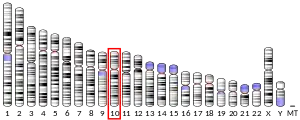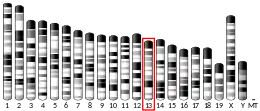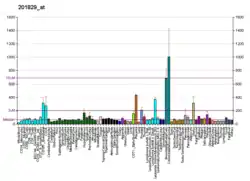NET1
Neuroepithelial cell-transforming gene 1 protein is a protein that in humans is encoded by the NET1 gene.[5][6]
References
- GRCh38: Ensembl release 89: ENSG00000173848 - Ensembl, May 2017
- GRCm38: Ensembl release 89: ENSMUSG00000021215 - Ensembl, May 2017
- "Human PubMed Reference:". National Center for Biotechnology Information, U.S. National Library of Medicine.
- "Mouse PubMed Reference:". National Center for Biotechnology Information, U.S. National Library of Medicine.
- Chan AM, Takai S, Yamada K, Miki T (Jul 1996). "Isolation of a novel oncogene, NET1, from neuroepithelioma cells by expression cDNA cloning". Oncogene. 12 (6): 1259–66. PMID 8649828.
- "Entrez Gene: NET1 neuroepithelial cell transforming gene 1".
Further reading
- Shen X, Li J, Hu PP, et al. (2001). "The activity of guanine exchange factor NET1 is essential for transforming growth factor-beta-mediated stress fiber formation". J. Biol. Chem. 276 (18): 15362–8. doi:10.1074/jbc.M009534200. PMID 11278519.
- Dobrosotskaya IY (2001). "Identification of mNET1 as a candidate ligand for the first PDZ domain of MAGI-1". Biochem. Biophys. Res. Commun. 283 (4): 969–75. doi:10.1006/bbrc.2001.4880. PMID 11350080.
- Strausberg RL, Feingold EA, Grouse LH, et al. (2003). "Generation and initial analysis of more than 15,000 full-length human and mouse cDNA sequences". Proc. Natl. Acad. Sci. U.S.A. 99 (26): 16899–903. Bibcode:2002PNAS...9916899M. doi:10.1073/pnas.242603899. PMC 139241. PMID 12477932.
- Suzuki Y, Yamashita R, Shirota M, et al. (2004). "Sequence comparison of human and mouse genes reveals a homologous block structure in the promoter regions". Genome Res. 14 (9): 1711–8. doi:10.1101/gr.2435604. PMC 515316. PMID 15342556.
- Gerhard DS, Wagner L, Feingold EA, et al. (2004). "The status, quality, and expansion of the NIH full-length cDNA project: the Mammalian Gene Collection (MGC)". Genome Res. 14 (10B): 2121–7. doi:10.1101/gr.2596504. PMC 528928. PMID 15489334.
- Qin H, Carr HS, Wu X, et al. (2005). "Characterization of the biochemical and transforming properties of the neuroepithelial transforming protein 1". J. Biol. Chem. 280 (9): 7603–13. doi:10.1074/jbc.M412141200. PMID 15611121.
- Alberts AS, Qin H, Carr HS, Frost JA (2005). "PAK1 negatively regulates the activity of the Rho exchange factor NET1". J. Biol. Chem. 280 (13): 12152–61. doi:10.1074/jbc.M405073200. PMID 15684429.
- Kimura K, Wakamatsu A, Suzuki Y, et al. (2006). "Diversification of transcriptional modulation: large-scale identification and characterization of putative alternative promoters of human genes". Genome Res. 16 (1): 55–65. doi:10.1101/gr.4039406. PMC 1356129. PMID 16344560.
- Leyden J, Murray D, Moss A, et al. (2006). "Net1 and Myeov: computationally identified mediators of gastric cancer". Br. J. Cancer. 94 (8): 1204–12. doi:10.1038/sj.bjc.6603054. PMC 2361249. PMID 16552434.
- García-Mata R, Dubash AD, Sharek L, et al. (2007). "The nuclear RhoA exchange factor Net1 interacts with proteins of the Dlg family, affects their localization, and influences their tumor suppressor activity". Mol. Cell. Biol. 27 (24): 8683–97. doi:10.1128/MCB.00157-07. PMC 2169424. PMID 17938206.
External links
- NET1 human gene location in the UCSC Genome Browser.
- NET1 human gene details in the UCSC Genome Browser.
- PDBe-KB provides an overview of all the structure information available in the PDB for Human Neuroepithelial cell-transforming gene 1 protein (NET1)
This article is issued from Wikipedia. The text is licensed under Creative Commons - Attribution - Sharealike. Additional terms may apply for the media files.





